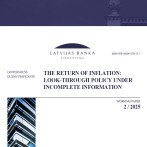In August annual inflation returns to positive territory
As was expected, in August energy prices continued to fall, thus hindering inflation growth. Meanwhile, resilient demand and changes in the excise tax on alcoholic beverages had a positive effect on the price growth. Overall, the annual increase in consumer prices resumed and stood at 0.1%, according to the CSB data.
In August, oil prices reached their lowest monthly average since January 2015. This explains both a 5.4% fall in fuel prices and the JSC Latvijas Gāze new forecast of tariffs for its industrial customers. These tariffs may somewhat decrease even further in September, thus affecting heating prices. In the second half of August and early September, there have been different signals regarding the oil price dynamics in the near future. For instance, the announcements about steeper-than-expected US economic growth triggered a temporary rise in oil prices. According to the market participants' assessment, however, the excessive supply of oil products may continue to sustain the price of crude oil at the present or even lower level over the next two years.
Similarly to the manufacturing and retail trade development data for July, GDP data for the first quarter of 2015 published last week also suggest that the economic growth is slightly stronger than initially projected. Thus, price levels in several groups of goods that are part of core inflation and in several services sectors are continuously maintained by sustained demand. Over the first eight months of this year, the average price level in such sectors as catering, recreational and cultural services, services of hairdressing salons and personal grooming establishments, financial services, goods and services for routine household maintenance, etc. exceeded that of the corresponding period of the previous year by 3%–9%. The above rise in prices is considerably steeper than the average inflation. Nevertheless, those sectors, too, partly benefited from the falling food and energy prices.
The rising prices of alcoholic beverages are partly explained by changes in the excise tax (the excise tax was lowered for several beverages). However, prices of some beverages, e.g. beer, are also affected by the seasonal demand which depends on weather conditions. On account of the cool summer months of June and July, beer consumption was quite subdued. However, the warmer weather conditions in August may have facilitated the demand for beer and an increase in beverages consumption. Besides, the relatively broad range of open-air cultural and recreational events held in August may have also partly stimulated the demand for beverages and influenced their prices.
Overall, the stable, albeit slower-than-desired, economic growth continues to maintain the core inflation. Despite the fact that the growth forecast for the next year has been revised slightly downwards, the next year's growth rate might be even higher than that of this year, thus continuing to exert a positive impact on inflation. Taking into account the indirect tax initiatives currently discussed in relation to the budget plan for 2016, it is likely that the next year's contribution from indirect taxes to core and headline inflation will be slightly larger than that of this year. In the same way, the impact of the fall in energy prices will gradually fade due to the base effect, and a new drop in oil prices on a scale similar to that of this year is not likely. Thus, overall annual inflation of 2016 is expected to exceed that of this year and is likely to reach 1.3%.
Textual error
«… …»






